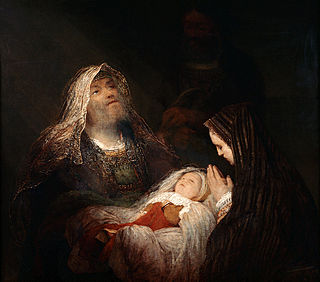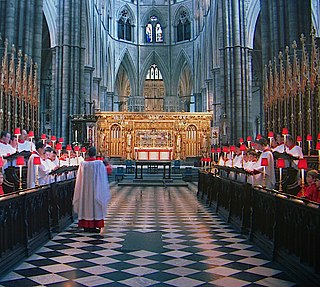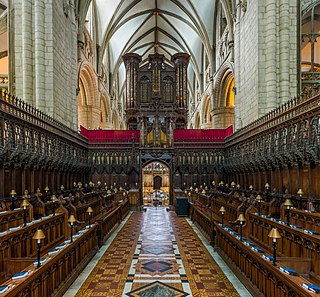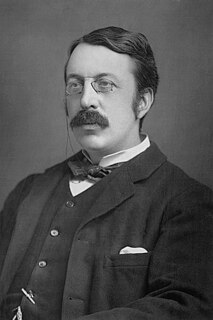
Vespers is a service of evening prayer, one of the canonical hours in Eastern Orthodox, Coptic orthodox, Roman Catholic and Eastern Catholic, Lutheran, and Anglican liturgies. The word for this fixed prayer time comes from the Greek ἑσπέρα and the Latin vesper, meaning "evening".

The Magnificat is a canticle, also known as the Song of Mary, the Canticle of Mary and, in the Byzantine tradition, the Ode of the Theotokos. It is traditionally incorporated into the liturgical services of the Catholic Church, the Eastern Orthodox churches, and the Anglican Communion. Its name comes from the incipit of the Latin version of the text.
A canticle is a hymn, psalm or other Christian song of praise with lyrics taken from biblical or holy texts other than the Psalms.

The Nunc dimittis, also known as the Song of Simeon or the Canticle of Simeon, is a canticle taken from the second chapter of the Gospel of Luke, verses 29 through 32. Its Latin name comes from its incipit, the opening words, of the Vulgate translation of the passage, meaning "Now let depart". Since the 4th century it has been used in services of evening worship such as Compline, Vespers, and Evensong.

Anglican church music is music that is written for Christian worship in Anglican religious services, forming part of the liturgy. It mostly consists of pieces written to be sung by a church choir, which may sing a cappella or accompanied by an organ.
In Anglican church music, a service is a musical setting of certain parts of the liturgy, generally for choir with or without organ accompaniment.
Robert Parsons was an English composer of the Tudor period who was active during the reigns of King Edward VI, Queen Mary I and Queen Elizabeth I. He is noted for his compositions of church music.
The Southern Cathedrals Festival is a 5-day music festival held on rotation among the cathedrals of Chichester, Winchester and Salisbury in England, in the penultimate week of July. The festival was restored in 1960 after initial attempts to create the annual occasion - such efforts led to 28 years without it. The directors of music act as festival director when it is their cathedral's turn to host the event - currently, they are Charles Harrison, Andrew Lumsden and David Halls.
Marcus Huxley is an English cathedral organist, who served in St. Philip's Cathedral, Birmingham between 1986 and 2017.

The Magnificat by John Rutter is a musical setting of the biblical canticle Magnificat, completed in 1990. The extended composition in seven movements "for soprano or mezzo-soprano solo, mixed choir, and orchestra " is based on the Latin text, interspersed with "Of a Rose, a lovely Rose", an anonymous English poem on Marian themes, the beginning of the Sanctus and a prayer to Mary. The music includes elements of Latin American music.

Evensong is a church service traditionally held near sunset focused on singing psalms and other biblical canticles. In origin, it is identical to the canonical hour of vespers. Old English speakers translated the Latin word vesperas as æfensang, which became 'evensong' in modern English. It is now usually applied to the Anglican daily office but can also refer to the pre-Reformation form of vespers or services of evening prayer from other denominations.

Arvo Pärt's Nunc dimittis is a setting of the Latin canticle Nunc dimittis for mixed choir a cappella, written in 2001. It was published by Universal Edition.

Magnificat and Nunc dimittis for St Paul's Cathedral, also known as the St Paul's Service, is a setting by the English composer Herbert Howells of the Magnificat and Nunc dimittis for the Anglican service of Evening Prayer. Scored for four-part choir and organ, it was written in 1950 for St Paul's Cathedral in London.

Magnificat and Nunc dimittis for Gloucester Cathedral, also known as the Gloucester Service, is a setting by the English composer Herbert Howells of the Magnificat and Nunc dimittis for the Anglican service of Evening Prayer. Scored for four-part choir and organ, it was written in 1946 for Gloucester Cathedral. It was published by Novello in 1947.

In Exile is a motet by Herbert Sumsion, who was for decades organist at Gloucester Cathedral. He set in 1981 a biblical text from Psalm 137 in English, beginning "By the waters of Babylon", scored for double choir a cappella. The motet was published by Basil Ramsey.
The so-called Great Service is a set of canticles and other items for the Matins, Communion and Evensong services of the Anglican Church, composed by William Byrd. It is the last and most elaborate of his four services for the English liturgy. Byrd provides settings of seven items for the three principal rites of the liturgical day

The Service in B-flat major, Op. 10, is a collection of Anglican church music by Charles Villiers Stanford for mixed choir and organ containing the canticles for each of the principal services of the Anglican Church. Stanford set the traditional liturgical texts in English in 1879 when he was the organist of Trinity College, Cambridge. They were published by Novello in 1902. Stanford orchestrated the work in 1903, with additional organ.

The Daily Office in Anglican churches focuses the traditional canonical hours on daily services of morning prayer and evening prayer, usually following local editions of the Book of Common Prayer. As in other Christian traditions, either clergy or laity can lead the daily office. Most Anglican clergy are required to pray the two main services daily.

Collegium Regale is a collection of choral settings by the English composer Herbert Howells of the canticles for the Anglican services of Mattins, Holy Communion and Evening Prayer. Scored for four-part choir, solo tenor and organ, the pieces were written between 1944 and 1956 "for the King's College, Cambridge". The first of the pieces were first published by Novello in 1947, and they have become a popular piece of music in the Anglican church music repertoire.












